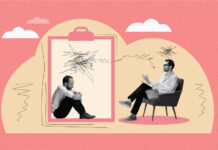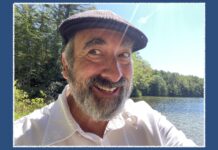Although the incidence and prevalence of so-called “mental disorders” have remained relatively stable, the global rise in psychiatric care has caused a growing burden for healthcare systems and societies. Last year, a group of interdisciplinary scholars led by Timo Beeker introduced the concept of psychiatrization as a conceptual framework for understanding the processes by which more and more individuals are diagnosed and treated as mentally ill, and psychiatric practices shape more and more areas of life.
In response to these scholars’ call for transdisciplinary research on psychiatrization, new work by Sebastian von Peter explains how the Open Dialogue (OD) approach to mental healthcare can be used as a potential strategy to counter the wave of global psychiatrization.
 Psychiatrization has been highly criticized, notably as a tool of coloniality. The medicalization of everything from depression to loneliness has been well-documented, and its effects are potentially harmful to individuals, societies, and public healthcare.
Psychiatrization has been highly criticized, notably as a tool of coloniality. The medicalization of everything from depression to loneliness has been well-documented, and its effects are potentially harmful to individuals, societies, and public healthcare.
These potential harms include overdiagnosis and overtreatment, undermining mental healthcare provision for the most severely ill, and “boosting medical interventions which incite individual coping with social problems, instead of encouraging long-term political solutions.”
Developed in Finland, Open Dialogue (OD) is a multi-professional, continuous, needs- and outpatient-oriented model of psychiatric support for a crisis. Its methodology represents a shift from the psychiatric paradigm of searching for the “correct diagnosis” to a focus on meaning-making, common language, and including a network of different voices in the process of treatment.
“In [Open Dialogue], the social network and the user are involved in joint treatment planning and treatment engagement from the beginning and throughout the whole therapeutic process (sometimes for years if necessary).”
This approach draws upon the resources and creativity of the service user and their social network to make decisions and develop a course of action and treatment. This non-institutional, non-medicalized approach also harmonizes with current rights-based approaches to mental health treatment.
Based on several cohort studies conducted in the ’90s and early 2000s, OD has proved effective for significantly reducing in-patient stays as well as reducing relapse rates over time. These studies also show the re-integration of up to 84% of service users into work and education and low and infrequent use of neuroleptic medication throughout OD treatment.
Overall, evidence from the cohort studies of OD treatment showed that “the treatment outcomes achieved in each case remained fairly stable over the entire period [of 13 years] or even increased over time.” Thus, OD constitutes a promising approach to mental healthcare that honors services users’ rights and does not increase medicalization, thus providing a promising potential counter to processes of psychiatrization worldwide.
Yet despite OD’s promising track record, even this model of service provision could be appropriated by a psychiatrizing treatment system. The authors warn:
“This danger [of appropriation] is even more pertinent, as calls for more democratic, human rights-based, empowering or recovery-oriented psychosocial support systems seek to expand, yet often without the willingness or sufficient reflexivity to change customary routines.”
The implementation of an OD approach to mental healthcare and its impact on de-psychiatrization will depend on how it is implemented in a context of care, support, and respect. Indeed, von Peter writes:
“OD can be considered as only one component to bring about the urgently needed changes in the mental healthcare system.”
****
Von Peter, S., et al. (2021). Dialogue as a Response to the Psychiatrization of Society? Potentials of the Open Dialogue Approach. Frontiers in Sociology. (Link)















There are MANY approaches to mental health that avoid psychiatry and their toxic “theories” about human life and behavior.
I would support any alternative to psychiatric “care.”
But to actually slow down or halt the advance of psychiatry and its ideas is a whole other matter. We know already that any believable alternative to psychiatry will be fought and discredited. The operation to install psychiatrists (and doctors) as the arbiters of modern life rolls forward like a robot with terrifying monotony and disregard for human life. We must arm ourselves with knowledge and skills that can deal with this without becoming a new version of it. I don’t think it can be a traditional battle, war or revolution. We must grow strong enough to laugh in their faces in a way that will stop them in their tracks. A certain number of us must become simply invincible to their poisons. And eventually they will realize that are doing the wrong thing and stop. This they are almost certain will never happen (though they fear very rightly that it could!). We must be just as certain that it can happen.
Report comment
Doing nothing at all is usually a far more effective intervention than psychiatry is able to come up with on its best day.
Report comment
Thank you, Jenny, for pointing out that Open Dialogue is a decent alternative to today’s scientific fraud based, “invalid,” psychiatric DSM “bible” theology. And I agree, other options “to bring about the urgently needed changes in the mental healthcare system,” are needed.
As an initially non-DSM “bible” educated – now a DSM aware, but non-DSM “bible” believing – artist, who found solace and healing in the visual arts. I do highly recommend the non-DSM stigmatizing visual arts, as therapy.
As one who also learned about the culinary arts, first hand, through a brother who studied that; I also found studying and participating in the culinary arts, to be beneficial.
I also found maintaining a regular exercise routine, and spending time in nature, like biking, hiking, and the art and science of gardening, very healing endeavors.
I also found keeping a journal, while researching for medical truth, then sharing my medical research findings – which did point out medical proof of the iatrogenic etiology of the “sacred symbol of psychiatry” – on MiA; thus I also found the writing arts, to be very therapeutic.
And as an artist, with an odd gift, of being able to tell the story of my life, and the awakening to my dreams, in the lyrics of music, and other art forms – as if my subconscious self has been functioning my entire life as some sort of muse for other artists within the “collective unconscious.” I am a big believer in the healing power of the musical arts, as well.
For example, last night, as I was watching the 1990’s movie, “Mr. Holland’s Opus,” after a nice birthday dinner with my family. And as a woman, who has a beloved son named Cole. I’d recommend people, watch that movie. Pay particular attention to the song the music director dedicates to his son, named Cole. And the music teacher’s fight against the defunding of the arts. It is a good 1990’s movie, tear jerker for me – and one more song that sings out the truth about my love for my child, and children – but a great movie for anyone.
Nonetheless, obviously I found participating in and enjoying the arts, in general, to be therapeutic – when it comes to healing from psychological and psychiatric torture, oppression, and proven malpractice.
And there are those doctors and researchers who are now claiming the “fake news,” “fierce Pharma,” and the medical propaganda – that we are all living through right now, regarding Covid – has resulted in a “mass formation psychosis.” So we all may need healing from psychological and psychiatric oppression, lies, and propaganda now.
Nonetheless, I propose – as a society – we start to re-fund the arts. I’m amazed at how creative the children I taught became, and how they literally learned to utilize the creative side of their brains, after being taught how to utilize that side of their brain. So I know arts education is important.
And we should probably also start to defund the oppressive, psychosis creating, DSM “bible” believing industries / religions / industries, et al as well.
https://en.wikipedia.org/wiki/Toxidrome
But in regards to the fiscally irresponsible, bailout needing, globalist banksters – who have funded all this miseducation of the American public. Well, suffice it to say, of course we need “the tables of the money changers” overturned again. Let’s pray the Triune God is in the process of doing that.
Good news, though, now that I’ve got some of my work online, despite the fact most of it needs to be re-photo-documented properly. My work does seem to be getting at least a little attention from the NY and CA art watchers. Despite the fact that, right now, I’m merely a woman hanging out in the wilderness.
Let’s hope that someday – only the “Spirit cooking” and “pedophile” artists’ work – which is what’s revered by the globalist “elite” currently running the American art industry – is not all that is remembered about our current American society. And that the work of the Spirit led, save the children artists’ work, is also considered valuable some day – in part because it visually documents the very reality of our very divided society.
Report comment
Jenny, I think everyone here on the MIA website is keen to see de-psychiatrization, and OD provides some light on how this might be achieved. One of the facets that von Peter et al credit OD for identifying is its use of language and meaning-making. Using non-psychiatric language the facilitators pay attention to words, stories, and themes the network participants perceive as important, and facilitate a ponderance upon these, tolerating silences. One could be excused for seeing this as a form of psychoanalysis, albeit without the authority of the analyst offering interpretations. (Which von Peter describes in the section on professionalism.) When Trigant Burrow, a founder of the American Psychoanalytic Association and contemporary of Freud, broke with the APA (they in fact kicked him out), he formed a community, that lasted well beyond his death, that was without the authority of an analyst offering interpretations, and that appears very much like OD.
So perhaps one of the paths to de-psychiatrization is thru a renewal of interest in psychoanalysis, albeit without the authority of analyst. Indeed we can see this with the relational mind research that Seikkula is heading at the University of Jyväskylä, where he is taking an OD approach to a variety of other problems. Recently radical enactivism has offered a new slant on what used to be called “the unconscious” that was the target of analysis. This is easiest to understand by using Daniel Kahnman’s ‘fast’ and ‘slow thinking, to suggest that mostly we use ‘fast’ (intuitive) thinking, especially when we are in conversation with each other; and when we both do the conversation ‘takes on a life of its own’ (think of conversations with friends). Blocks in this are often mental health problems – and the task of OD facilitators or therapists is to get the conversation flowing again. The task of the therapist is to dissolve the ‘block’, and not to name it. (To name is part of slow thinking.) A similar ethos existed in the zen monasteries.
Psychiatry first adopted versions of Freudian (and his disciples) psychoanalysis, but as it was wrongheaded (due largely to the receptive culture it appeared in – see ‘The Southern Theory’), and so they moved to the medical model, which was equally wrong-headed, for the same reasons. As Wittgenstein commented on psychoanalysis from his day, we can say the same for psychiatry today, “its done little good, and a great deal of harm”. But we shouldn’t let this distract us from the potential to do good; that change for the better can come thru talk.
Report comment
We must also remember that psychoanalysis was not accepted until after Freud disavowed his trauma theory and blamed the patients’ woes on his own “complexes” instead of focusing on the causal traumatic factors. I’d say that psychoanalysis was thoroughly defanged before it was allowed to become popular, and hence was reduced to a tiny fraction of its potential effectiveness. The removal of the right of the clinician to “interpret” seems like a critical move. But I wonder how many clinicians are fully capable of resisting the urge to foist their evaluations onto the client.
Report comment